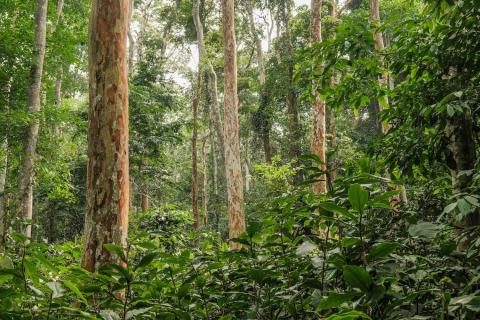
On 6 December 2018, the Congo Basin Forest Fund (CBFF) Secretariat in collaboration with Independent Development Evaluation (IDEV) organized a knowledge-sharing workshop to reflect and discuss the lessons learned (both operational and project) from 10 years of implementing the CBFF. The event, titled Congo Basin Forest Fund: 10 years in the service of the second lung of the earth, provided an opportunity to examine the results achieved and challenges faced by the CBFF since its inception.
Since the Fund was foreseen to close at the end of 2018, IDEV undertook an evaluation of the CBFF in 2017, which was presented to the Bank’s Committee on Operations and Development Effectiveness (CODE) in July 2018.
Presenting the findings and recommendations of the evaluation at the workshop, Foday Turay, Chief Evaluation Officer at IDEV, said that overall, the CBFF has performed well. Its portfolio was strategically coherent and effective in generating relevant outputs and outcomes against its seven main areas, including the promotion of innovations for transformational change required to reduce deforestation, and supporting capacity development in the Congo Basin countries. The CBFF projects, however, have been inefficiently delivered, with results that are unlikely to be sustained, notably where projects do not have alternative sources of funds. The evaluation recommends that the CBFF and its Governing Council ensure a full completion phase for the fund, and that the secretariat invest in capturing and capitalizing on all lessons learned from the CBFF’s innovations and achievements.
Serving as a forum for a broader reflection on how to leverage the lessons learned to inform the Bank’s work in forestry management and climate change, the workshop provided IDEV with an additional platform to present to key stakeholders the recommendations from its evaluation which are to:
- Analyze how the political and international environment has changed since 2008;
- Increase AfDB ownership and governance of the trust fund;
- Coordinate with national agendas related to the United Nations Collaborative Programme on Reducing Emissions from Deforestation and Forest Degradation in Developing Countries (REDD+), climate resilience and sustainable forest and landscape management;
- Tailor operations and procedures;
- Improve communications; and
- Improve performance measurement and reporting of projects.
The event also provided an opportunity to discuss other important issues such as the Bank’s engagement with civil society groups.
The workshop, which was an important step in sustaining the results of the CBFF-funded projects and in capitalizing on the innovative models and tools developed by the Fund, was attended by CBFF donors, members of the CBFF Secretariat, Bank senior leadership and operations staff, some of which participated in the workshop remotely via video-conference.
Related documents
- IDEV presentation at AfDB Knowledge Sharing workshop on CBFF
- Evaluation of the Congo Basin Forest Fund: A thematic evaluation
About the Congo Basin Forest Fund (CBFF)

The CBFF is a multi-donor Trust Fund hosted by the Bank, which aimed to alleviate poverty and address climate change through the reduction of deforestation and forest degradation in the Congo Basin. The Fund is jointly funded by the Governments of the United Kingdom, Norway and Canada and is supported by the Central Africa Forest Commission (COMIFAC). Established in 2008 for a period of 10 years, its sunset date was 31st December 2018.
* Photo credit: CIFOR

